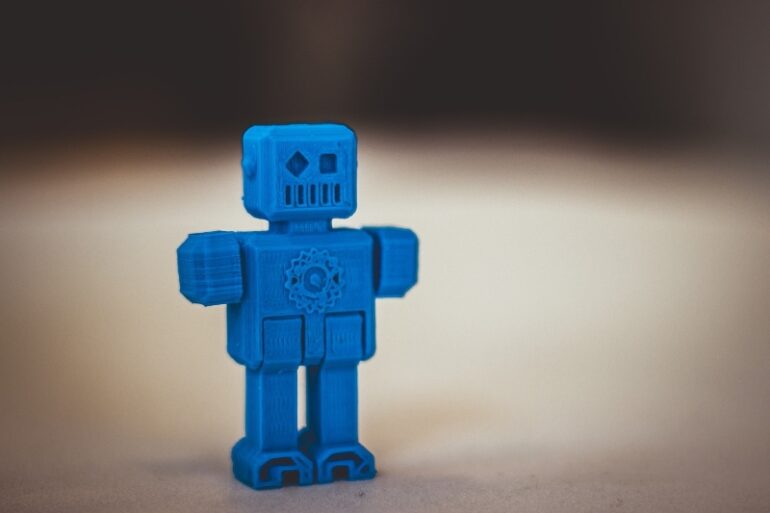Ron’s Gone Wrong is a computer-animated sci-fi comedy that tells the story of a friendship between an AI bot and a middle-schooler. With its well-structured story and stunning animation, it warms the hearts. Besides being captivating, it offers a lot to think about the effects of technology on children, the future of AI, and the exploitation of private data.
By Lamia Berki
Don’t you have a B-Bot yet? Well, everyone has in Ron’s Gone Wrong! The science-fiction comedy film released in 2021 and mainly directed by Sarah Smith and Jean-Philippe Vine, is a fun, fast-paced, and perfectly animated film. Co-director Octavio E. Rodriguez was in the Art Department of Incredibles 2 and Coco, which is not surprising considering the quality of the film. Besides all the fun and visual feast, it is highly evocative of the problems of our decade such as the excessive usage of social media amongst young people and the usage of AI agents.
So, what is this B-Bot that we still don’t have? B-Bots are robot buddies designed by the tech giant Bubble to help people find the perfect friends for them through an algorithm. It not only collects data of its owner to find a match for them but also keeps the owner entertained. With a B-Bot, one can listen to music, tweet, take photos and videos, go on live-streams, perform research – in short, everything that is possible within the framework of computers and phones. It is advertised as a friend perfectly suited for people with social anxiety. It is »the future of friendship« thanks to Artificial Intelligence algorithms.
Ron’s Gone Wrong
USA 2021
107 minutes
Directed by: Sarah Smith, J. P. Vine
Starring: Jack Dylan Grazer, Zach Galifianakis, Ed Helms, and others
Jack Dylan Grazer as Barney Pudowski, the main character, who is a middle-schooler in California, feels like he needs a B-Bot after seeing all his friends getting one. Already having difficulties with befriending people, he has to get one to become involved in his school-mates’ fun and colorful life. He begs his father for a B-Bot, being overwhelmed by the peer pressure. Finally, his father puts a great effort into making his son happy on his birthday but arrives late in the Bubble store, so he has to get him a B-Bot from a delivery guy in the alley.
How Wrong has Ron Gone?
The box that Barney’s father luckily gets at the last minute is slightly damaged. Although Barney gets super happy to have a B-Bot, he instantly realizes that something is wrong with it. It does not collect the data from its owner’s social media accounts, dances, cooperates, or any of the fun stuff that those of his schoolmates do. Instead, it moves as it wants, and even learns Barney’s name wrong as Absalom. He encounters a B-Bot that is not set yet – it needs to be connected to the Bubble Network. He is one of his kind, not a part of the collective brain. Therefore, it has its own characteristics that are caused by the malfunction.
Barney decides to return it to the Bubble store right away, but something happens on the way that will bond Barney and the B-Bot RONB1NT5CAT5CO. And so begins the friendship between Ron and Barney.
»Best Friend out of the Box«
Throughout the movie, Barney takes up the mission to teach Ron how friendships work so that he can do what he was designed to do: finding friends for its user. Although Ron works very well in that he obeys Barney, their adventures are colored with misunderstandings and absurd moments that would not take place between two humans. The chart that Barney draws for Ron to understand the workings of friendship is core to the dynamics of their relationship. As they spend more and more time together, Barney assigns tasks to Ron so that he learns how to be his friend. According to the chart, Ron must know and like everything about Barney, and always be on his side. However, Barney forgets that friendships are mutual.
Instead of a synthetic friendship, that is made possible through the algorithm where the bots are programmed to use the data to comply with their needs, what Barney and Ron have is represented as a genuine friendship that finds its way through their interaction and experiences. What is exciting about the film is that it shows this natural development between AI and humans. But the movie is also evocative of teenagers’ dependency on technology and social media platforms, as the B-Bots also offer an escape from reality. The products that offer the »future of friendship« create the illusion that they are not alone as they are afraid to be. In that sense, there are clear allusions to Giant Tech companies like Apple or Facebook that allure young people into social media with the display of socializing, which might on the other hand also cause feelings of isolation and anxiety in society. Moreover, the B-Bots collect data on how people reflect their identities on social media, therefore it would be unrealistic to expect the bots to get to know the real personality of their owners. From that aspect, the friends that would come out as perfect matches according to the friendship algorithm would not be more than a bunch of people with a common ground. Framing Ron’s malfunction as a strength rather than a weakness is an inspiring thought that can be influential in teenagers’ understanding of friendship and individuality.
Food for Thought: Mainly Cookies
Despite the cuteness of B-Bots, especially Ron who has a unique and fun disposition, it might be problematic to take the implementation of AI in the movie for granted. Artificial Intelligence has become indispensable to our lives, changing them rapidly. Since the first appearance of AI in the 1950s, the cultural facet has been somewhat different from what it currently is. Naturally, the mystery of the possibility of creating another form of consciousness piqued writers’ and producers’ interests. However, if creative works are the only means by which children learn about AI, it could lead to a fallacy where humans anthropomorphize AI agents.
In Ron’s Gone Wrong, the title choice goes hand in hand with the idea that an AI agent like Ron is wrong. However, the general feeling it rises in the hearts of the audience is the opposite. The movie stands somewhere between acknowledging the downsides of the current implementation of AI and boosting the idea of an anthropomorphized AI that would be involved in daily life.
So What?
The usage of private data, mass-produced technology, and the pressure put on individuals who don’t use cutting-edge technological devices are among the downsides apparent in the movie. But the average audience is already aware of the potential dangers of technology both on a social and individual level. In an interview, Sarah Smith states that she was inspired by Her, Spike Jonze’s movie about a love story between the character and his virtual assistant: »We had to find a way of making a funny animated movie that explores children’s relationships with technology.« What might be tricky about this insightful idea is how children’s understanding of AI is only shaped by the cute representations of imaginary AI agents instead of general knowledge given by professionals. Considering the wide scope of AI that is crucial, be it social or scientific, in most of the fields that are indispensable to our lives, every user of AI should have a better understanding of it than just saying »Hey Siri, do you believe in God? « without knowing how it works. With a basic knowledge of AI, one could easily detect the problematic sides of AI’s representation in the movie. For that end, movies like Ron’s Gone Wrong do not have to change their content, but children’s knowledge of AI should not stay limited to what they watch.
To start with, being aware of the basic differences between AI agents and the human mind is crucial not to fall into the misconception that AI robots that have consciousness would be our best friends. At the moment, AI is far from being like Ron, who reacts perfectly to his context. Ron is not an example of narrow AI that people encounter on a daily basis but rather of Artificial General Intelligence (AGI). Whereas narrow AI performs tasks without self-awareness (e.g., chatbots), AGI, though not fully realized yet, has the ability to learn, and apply knowledge on future problems (e.g., B-Bots). As it is implied in the movie in the scene where Ron nearly destroys Barney’s room by examining everything that he owns just because he got the task to learn everything about Barney. In the future, it could be the case that an AGI, also known as a cognitive AI agent like Ron, destroys a whole garden when it receives the task »get rid of the pest in the garden.«
The reason for this kind of extremities is that in Deep Learning, the processes are not supervised by humans, therefore the logic behind the decisions is not clear. The machine works to reach the goal through artificial neural networks with its own way, and this way does not have to comply with the logical processes of the human mind as long as the mission is accomplished. It is also clear in the movie that AI works differently than humans. Yet, the funny situations that arise when Ron does not get the necessities of the specific context are neatly picked to support the suggestion that AI agents should have unique identities in the future, which is tricky for the audience’s perception of AI.
Should Robots Be Slaves?
What kind of a person prefers AI bots/assistants to be slaves when they can be our best friends? How could it be problematic to let children watch this entertaining movie that emphasizes the importance of friendship and sympathy? Although Ron’s Gone Wrong is worthy of praise and appreciation for its production and story, potential problems with children’s way of getting acquainted with AGI are not trivial. Explicating the mentioned problems, Joanna J. Bryson discusses the ethics of building AI agents/robots to take them as »companions« rather than »slaves.« Though the usage of the very term might seem scary and a vicious cycle at first, the essay offers good insight into the topic. Creative productions like Her or Ron’s Gone Wrong will keep emerging just as AI keeps improving. In order to emotionally keep up with the pace of the advancement in the field of AI, one should intellectually surround themselves with what it is and where it stands. I believe that is the reason why demystifying AI has gained more and more importance in the last decades. To critically reflect on such colorful and pleasant productions as Ron’s Gone Wrong can be intriguing.






